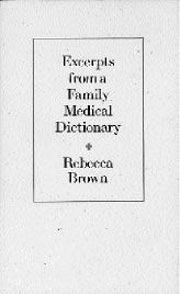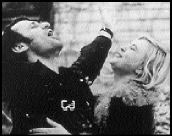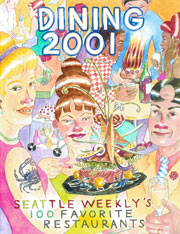EXCERPTS FROM A FAMILY MEDICAL DICTIONARY
by Rebecca Brown (limited edition from Grey Spider Press, $125 hardcover, $45 paper) Bailey/Coy Books, 414 E. Broadway, 323-8842 7 p.m. Wed., Sept. 12
TWO LITERARY ARTS merge in Rebecca Brown’s latest work, Excerpts From a Family Medical Dictionary. At first glance, it’s hard not to notice that this woodcut-designed, letterpress-typed, handmade work is a wonderful addition to the world of book arts. Its sheer visual simplicity, quality typeface, and the resonant red cross adorning the cover recall old first aid texts you might uncover in your family’s attic. And Brown, one of our most prominent local authors, has every intention of keeping things simple; the situation she writes about more than justifies the lack of visual frill or whimsy.
Each chapter begins with a medical term and its clinical definition, which, as they accumulate throughout this relatively short work, become progressively dire. The story centers around the diagnosis and gradual passing of Brown’s mother from terminal cancer. Brown herself is there, taking care of her while her condition deteriorates. The outlook is bleak, the symptoms of illness and approaching death even bleaker, yet the strength of the person dying and the person writing coalesce into a powerfully direct commentary on family and loss.
This chronicle of a death foretold doesn’t revel in the gory details of bodily fluids and the ravages of cancer. For the most part the language is precise, detached, and carefully clinical. In assessing her mother’s condition, Brown relies on a stalwart first-person narrative that communicates just enough medical information while reminding us that this is her family member. She understands that not only is the end near for the woman who gave her life, but that this woman knows this without having to hear it from her daughter or anyone else. As when Brown recalls her mother’s lifelong habit of reading mysteries while in the bathtub, “She always knew the end before it happened.”
When her mother’s violent chemotherapy reactions lead to hospice care and death, Brown has yet to deliver the book’s most powerful scene. To commemorate their mother’s death, the family members participate in a ritual in which they cleanse her body in preparation for cremation. Her mother’s illness and suffering over, Brown shares the profoundness of her grief and love in describing the washing. The clinical descriptions we’ve followed throughout the book are finally usurped by a spiritual act that transcends the confines of physicality—and creates a beautiful finality in the text that the actual death doesn’t provide. “We washed our mother’s body and talked to her. . . . We washed her skin and told her that we loved her and we’d remember her. We thanked her for life, for being good to us and kind. . . . We told her everything was fine, that things were taken care of, that she could rest.”








